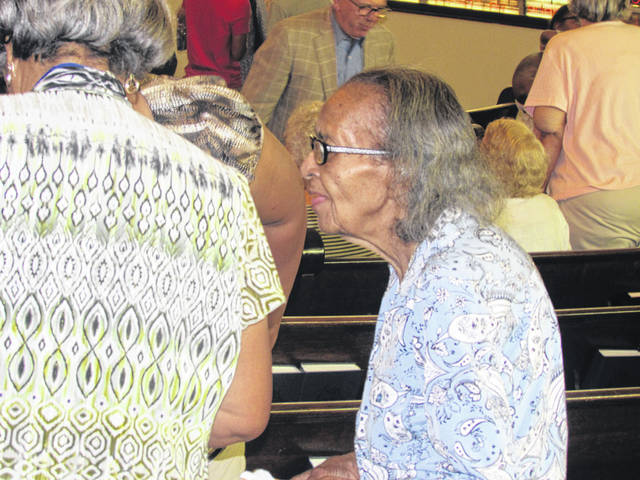
Hillsboro resident Myra Phillips was just 6 or 7 when she marched with her mother, Zella Mae Cumberland, and other mothers and their children. Though Phillips wasn’t totally aware of it at the time, she was marching with the group that would be remembered as Hillsboro’s Lincoln School Marching Mothers.
“I didn’t know how serious it was until I was older,” Phillips said. “[My mom] told us we were trying to go to school. She always told us, ‘Always study hard. People can’t take your education away from you.”
Cumberland and other mothers were marching to end segregation in Hillsboro’s elementary schools. Though Hillsboro High School was already integrated by 1954, there were still two all-white elementary schools, Webster and Washington, and one all-black elementary, the Lincoln School.
County engineer Phillip Partridge set the Lincoln School ablaze in the summer of 1954 in an attempt to end the segregation, but the Hillsboro Board of Education voted to repair the school instead of allowing the Lincoln School’s students to attend the all-white elementary schools. The school board also decided to designate new school zones, which ultimately forced some students to walk past one of the all-white schools to get to Lincoln.
On Sept. 9, 1954, mothers and about 50 children began marching to Hillsboro’s all-white elementary schools. They were denied entrance.
On Sept. 22, 1954, Cumberland was one of five mothers to file a suit with the help of the Dayton NAACP against the Hillsboro School Board and then-superintendent Paul Upp for the rezoning.
While her mother was in court, Phillips would stay with her grandmother, who told her and her sister that their mother was “taking care of business.”
For the next two years, Cumberland and Phillips and the rest of the Marching Mothers and their children walked to the schools only to be sent home.
During that time, the mothers’ efforts caught the attention of NAACP’s Thurgood Marshall, who had successfully won the Brown v. Board of Education suit in May 1954. Marshall sent New York NAACP attorney Constance Baker Motely to Hillsboro to help with the case.
But Marshall wasn’t the only one to take notice of the Hillsboro mothers’ efforts.
“I remember these men coming to Hillsboro once, and they said, ‘We can burn this town to the ground,” Phillips said. “I remember [the mothers] saying, ‘You go back where you came from. We don’t want violence.’ They said it was the Black Panthers. I think they came and left without anyone realizing.”
By the spring of 1956, the case, known as Clemons v. Board of Education of Hillsboro, had gone back and forth from the U.S. Court of Appeals, 6th Circuit and even to the Supreme Court. The Supreme Court refused to hear the case on April 2, 1956, and rejected Hillsboro’s further attempt to block integration.
After the Ohio Board of Education threatened to withhold all state funding, a majority of the Hillsboro School Board voted to integrate. By April 17, 1956, 11 black students attended Webster Elementary. By the fall of 1957, nearly three years after the mothers began the fight for equal education, Hillsboro elementary schools were completely integrated.
Winning the suit didn’t stop prejudice against the Lincoln School’s former students, however.
By the time the schools were integrated, Phillips had been out of school for a year and a half. Like many other students, she had been home-schooled until the schools were integrated.
“The kids weren’t as bad as some of the teachers were,” Phillips said. “When I started school, a teacher said, ‘You kind have to sit back by the bathroom.’ At the time, I didn’t know what they meant by ‘you kind’ because I was so young.”
Later, Phillips remembers other teachers, among other things, forcing her to stay in during recess because there was “black spit,” which the teacher later identified as melted snow and dirt, on another student’s desk.
“I just stayed in and did my work,” Phillips said. “I didn’t pay any attention to it.”
There were students who stood up for Phillips, though. In sixth grade, after a student originally from Cincinnati told Phillips not to touch him because he didn’t want her to “turn” him black, two of her classmates dangled him out a second-floor window by his foot until he apologized.
“I said, ‘You didn’t have to do that. I don’t pay any attention,’ and they said, ‘No, he’s not going to do that. We don’t do that here,’” Phillips said.
All the while, Phillips didn’t tell her mother about these incidents.
“I didn’t want her to get into anything,” Phillips said.
If she had told her mother, Phillips said Cumberland would have gone to the school.
“She always treated everyone nice, but if anyone would cross her, she’d put them in their place. That’s just the way she was,” Phillips said. “If you’re wrong, she’s going to tell you about it.”
Phillips said her mother was strong and independent throughout her life. After Cumberland got divorced, she bought her first house. She received a replica Thinking Man statue for her innovative work at Sears and Roebuck and ultimately retired from Kroger, where she’d finished each night with a balanced till for 27 years.
“She used to tell me all the time, ‘Don’t depend on anyone. Some people depend on someone and then when they’re left on their own, they can’t do anything,’” Phillips said.
Zella Mae Cumberland passed away at Highland District Hospital, the same hospital where she was born, on April 6, 2020. She would’ve been 91 years old in July.
For those who feel like they can’t make a difference, Phillips said, “You can always make a difference, even if it’s small.”
Some information for this story came from the Highland County Historical Society.
Reach McKenzie Caldwell at 937-402-2570.


